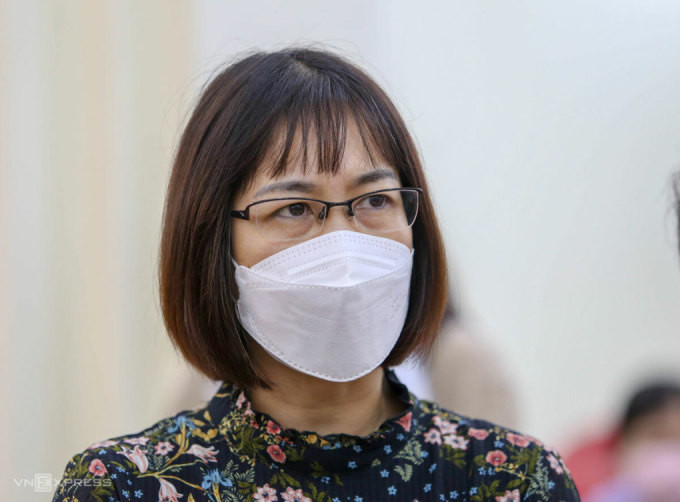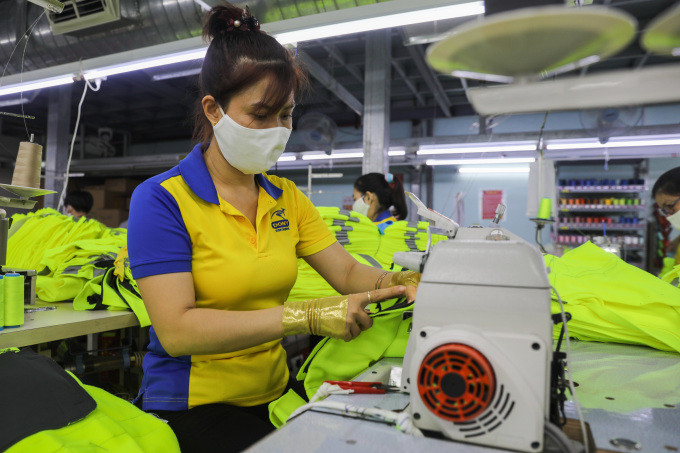VCCI representative, the association proposed to deduct from the Unemployment Insurance Fund, exempt union fees, and delay social insurance payments to support businesses and keep workers' jobs.
The fluctuations in the world situation have caused many of Vietnam's key export industries such as footwear to see a 20-30% decrease in orders; textiles and garments 30-50%; wood processing 70%; supporting industries 50%... Nearly half a million official workers have been directly affected. Many businesses have tried not to cut workers, but have stopped overtime, reduced working hours, and cut annual leave for workers.
Ms. Vi Thi Hong Minh, Deputy Director of the Office of Employers, Vietnam Confederation of Commerce and Industry (VCCI), said that at this time, the State needs to have policies to help businesses retain and keep jobs for workers. In particular, allocating to the Unemployment Insurance Fund is feasible because this is a short-term fund and currently has a large surplus. The annual increase in the fund is mainly due to contributions from both sides, supporting businesses is actually also spending on workers.
According to the report, the Unemployment Insurance Fund still has a surplus of about VND 55,750 billion after extending support for more than 414,000 workers under Resolution 116 (VND 38,000 billion package) and "still ensures safety because it is more than twice the total unemployment insurance expenditure in 2021".

Ms. Vi Thi Hong Minh, Vietnam Federation of Commerce and Industry
VCCI has not proposed specific content, but according to Ms. Minh, the authorities can directly support the cost for businesses to retrain or improve the skills of workers in an appropriate period of time. The purpose is to retain workers in the context of unemployment, instead of having them return to their hometowns. They can participate in training courses suitable for the job positions that businesses are lacking. Later, when orders return, companies will not have to recruit new ones.
Learning from previous support packages, this time's policy needs to be more innovative with more relaxed conditions. Ms. Minh cited the VND26,000 billion package (Resolution 68 issued in July 2021, including 12 policies to support workers and employers), although it supports retraining for workers, it is very difficult for businesses to access. Some companies spent 6 months preparing documents and developing plans, but in the end, they were not approved.
In addition, according to Ms. Minh, many businesses have requested to be exempted from paying union fees. Instead of transferring funds to higher-level unions, the State allows businesses or grassroots unions to retain and support workers for a certain period of time. After this period, businesses continue to make full contributions.
Representatives of the Vietnam Association of Seafood Exporters and Producers (VASEP) proposed that the State Bank expand credit room for businesses to borrow capital to take care of their workers. At the same time, the Government should loosen lending conditions for the 2% interest rate support package, stabilize gasoline and electricity prices to stabilize production.
VASEP expressed concern that businesses cannot borrow money from banks because the credit room has run out and not many units can access the 2% interest rate support package because the conditions are too strict. For example, requiring businesses to have no outstanding debts, but this is impossible after two years of the Covid pandemic.
Statistics at the end of August showed that the disbursement rate of the support package was very low, just over 4,400 out of a scale of 40,000 billion VND. Enterprises have not been able to access it due to difficulties in post-audit procedures, inspections, and audits by state agencies.

Workers work at Dony garment factory, Tan Binh district, Ho Chi Minh City, October 21, 2021
Mr. Nguyen Van Lam, Deputy Director of the Department of Labor, War Invalids and Social Affairs of Ho Chi Minh City, proposed that competent authorities consider extending the VND26,000 billion package, because many support policies for both workers and businesses are suitable to apply at this time. The sooner the policy is issued, the better because it is near the end of the year and the forecast for next year is "not bright".
"At this point, there is no way to keep up with the new policy to ensure harmony for both businesses and workers," Mr. Lam analyzed, and at the same time recommended that Vietnam Social Security provide access accounts to local Labor Departments to clearly grasp changes in workers' employment, ensuring information consistency in management between sectors.
In the immediate future, Ho Chi Minh City has developed a plan and clearly assigned roles to sectors in case workers lose their jobs. Specifically, the trade union supports train and bus tickets to return home; the social insurance book is closed to ensure benefits; the labor sector connects to find new jobs and the front seeks socialized funding to support workers in difficult times.
Sharing the same opinion with his counterpart, Mr. Nong Van Dung, Deputy Director of the Department of Labor, War Invalids and Social Affairs of Dong Nai province, commented that the wave of cuts will last at least until the first quarter of 2023, while workers who have lost their jobs and have reduced income will find it difficult to cope during Tet. Adjusting the support policy of the VND26,000 billion package is appropriate because if a new package is issued, localities will have to submit and wait for the People's Council to approve it "at the earliest, it will take two months".
More than 200,000 workers in Dong Nai are being affected as 120 businesses have seen a decrease in orders. Of these, nearly 22,000 workers have just had their contracts expired and not renewed. In the immediate future, the Department is urging businesses not to cut back but to find ways to avoid overtime or reduce working hours to keep jobs for workers. Dong Nai is proactively informing workers about the difficult situation and encouraging them to share with businesses. The parties are also negotiating for businesses to pay the regional minimum wage of 170,000 VND per day for workers who have to take turns off work.
According to statistics from the Vietnam General Confederation of Labor from the beginning of the year to November 28, more than 472,000 workers are directly affected by job loss and job loss. Of these, more than 41,500 workers have lost their jobs and 430,600 people have had their daily working hours reduced, work every other day, take paid leave, stop working, or have their contracts suspended.
The union emphasized that this is only the number of workers with contracts, if the number without contracts is included, it will be even larger. The General Confederation of Labor requested the Ministry of Labor, War Invalids and Social Affairs to direct local departments to grasp the situation, especially for the group without signed contracts, to have support measures because previous social security packages were very difficult to reach this group. The government needs to stabilize the prices of daily necessities at the end of the year so that workers can feel secure when jobs and incomes both decrease.
According to regulations, employees pay 1% of their monthly salary as the basis for social insurance contributions and employers pay 1% of their monthly salary to the Unemployment Insurance Fund; employees pay 1% of their salary to union fees and businesses pay 2% of their union fees.
According to VnExpress